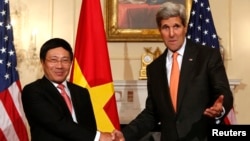The announcement last week that the United States is partially lifting an arms ban on Vietnam has been welcomed as an important step in warming ties between the two nations. However, human rights activists have criticized the move.
Despite coming just months after a Chinese oil rig stationed in waters also claimed by Vietnam sparked a tense stand-off between the two countries, the State Department was keen to stress the move to ease a ban on selling arms to Vietnam was not “anti-China.” Instead, it said the decision was partly a response to a lack of maritime capacity in the region.
Dr. Ian Storey, Senior Fellow at the Institute of Southeast Asian Studies (ISEAS), Singapore, said the decision was “definitely hastened by the oil rig crisis.” “It underscores America’s increasing concern about recent developments in the South China Sea and in particular how Chinese assertiveness is seen potentially to undermine U.S. interests in the sea,” he said.
The move to ease the ban is largely symbolic, Storey said, because Vietnam has a long-standing relationship with Russia to buy much cheaper equipment.
The speculation is that Vietnam is interested in purchasing the P3 Orion patrol aircraft used for marine surveillance.
Vietnam has been lobbying the U.S. to lift the ban for several years, but one condition set by Washington was an improvement in human rights.
“They have got around that partly by saying Vietnam has improved its human rights situation although it’s not a vast improvement on what it was," said Storey. "Second they said they will provide non-lethal equipment to improve its maritime domain awareness so we’re not talking about submarines or war ships or that kind of equipment, but that would allow Vietnam to improve its maritime surveillance in the EEZ.”
In an article for Foreign Policy, Asia Advocacy Director for Human Rights Watch John Sifton criticized the move, saying it “undercuts the brave work of Vietnamese activists” who look to the U.S. to pressure Vietnam into improving its human rights record.
Le Quoc Quyet is the younger brother of Le Quoc Quan, one of Vietnam’s most high profile dissidents, who was jailed last year for tax evasion - a charge critics say was politically motivated. “The U.S. is concerned about human rights in Vietnam, but it’s not a pre-condition [for the lifting of the ban]. They are concerned with many other issues as well as human rights,” said Quyet.
The U.S. State Department has said that Vietnam still needs to improve its human rights record, and Washington continues to evaluate its security relationship with Hanoi.
Nguyen Tri Dung is the son of dissident blogger Dieu Cay, who is serving a 12-year prison sentence for conducting propaganda against the state.
Dung said last week for the first time his father received a visit from officials from the U.S. embassy. Up until now, he has only been allowed to meet family. It is a sign, Dung believes, that the Vietnamese government is considering his release.
He believed this is connected to the partial lifting of the arms embargo.
“I think that if my father is released it must be something to do with the deal because I know them for a long time. I mean the Vietnamese government. They will not do anything without profit,” Dung said.
However, while his family welcome the possibility, Dung said he agrees that the U.S. should not sell arms to Vietnam while the latter’s track record on human rights remains poor.
“We need to have more critical move like to remove Article 88 about propaganda against the state and Article 79 about people who take action against the state, or Article 258 that forbids people from talking on Facebook or the Internet about the state. With these articles the government can catch anyone they want without any reason at all,” Dung stated.
He said he thinks if his father is set free, he will not be allowed to stay in Vietnam and would likely be offered exile in the U.S.
While speculation lingers on what equipment Vietnam will purchase, the decision is likely to send ripples through Vietnam’s internal factions as some of them seek closer ties with the U.S. against China.
So far Beijing has not commented on the move.




